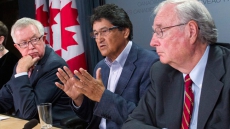VANCOUVER - Victor Montagliani, president of the Canadian Soccer Association, says it's misinformation and hyperbole to claim women players are being discriminated against because of plans to use artificial turf at next year's FIFA Women's World Cup.
FIFA, soccer's world governing body, will make the final decision on what turf will be used during next year's championship, which will be played in six Canadian cities, Montagliani said Thursday.
But he took exception to comments contained in a letter that the CSA was involved in "discriminatory treatment of women players."
"I will say that is the biggest form of misinformation I have ever heard in my life," Montagliani said in an address to the Vancouver Board of Trade.
"Those of you who know me, know that there would be a few more adjectives before that."
Later, addressing reporters, Montagliani again denied any sort of discrimination against women.
"That's nothing but misinformation and typical hyperbole that has no room in the game," he said.
The World Cup will attract 23 nations plus host Canada. The competition will see 52 matches between June 6 and July 5. BC Place Stadium in Vancouver will be the site of nine matches, including the final.
Other games will be held in Moncton, N.B., Montreal, Ottawa, Winnipeg and Edmonton.
A group of 40 international women soccer players have threatened a lawsuit over the plan to use artificial turf at the stadiums. They argue female athletes are being discriminated against because the men's World Cup is played on natural grass.
The group includes stars like American Abby Wambach and German's Nadine Angerer, the World Player of the year. Artificial turf is harder and faster than grass. It also has been linked to an increase in injury.
The group sent a letter to Canadian soccer officials and FIFA.
"Singling out this women's tournament for substandard treatment is a mistake," the letter says. "If your organizations will not engage in a meaningful dialogue on how to correct the discriminatory treatment of women players, we are prepared to pursue legal action which we are confident should succeed."
Celebrities such as actor Tom Hanks and NBA superstars Kobe Bryant and Kevin Durant have lent their support to the women.
Montagliani said the CSA currently spends just over $4 million a year on the women's program, about twice the amount spent on the men's program.
"The reality is we're very proud of the investment we make on the women's side of the game," he said. "We might be the only federation that invests more in the women's game than we do the men's game.
"To say we are not pulling our weight in that respect is nothing further from the truth."
Sophie Schmidt, a national team veteran and member of the squad that won a bronze medal at the 2012 London Olympics, also spoke at the event but was careful in her comments when asked if organizers should be forced to use natural grass.
"I will say I'm pretty sure that every soccer player of any age wants to play on grass," she said.
Montagliani couldn't say if it was even possible to install natural grass at the six stadiums in the time remaining before the tournament begins.
"I'm not a technician," he said. "That's not my expertise. Those are things that are in the bailiwick of FIFA."
Another issue would be who would pay for the cost of grass fields, the CSA or FIFA.
"Those are discussions that would have to happen," Montagliani said.
He denied the turf issue is a distraction.
"It's not a distraction to us," Montagliani said. "As organizers we are doing our daily job.
"Our staff is doing their daily job, our team is preparing for the World Cup."
The CSA says hosting the World Cup and this year's U-20 championship have a combined economic impact of $337 million across the country. The projections, compiled by the Canadian Sport Tourism Alliance, predict the World Cup will generate $267 million in economic activity.
British Columbia can expect $52 million in economic impact, of which $37 million will be in Vancouver.
Montagliani said the CSA is considering bidding for the 2026 men's World Cup. To be successful, the country would need eight venues to host games.
"To say a country like Canada doesn't have the infrastructure to do that or to invest in that, I find that highly doubtful," he said.
One stumbling block for bidding could be the Canadian's men's team struggles to qualify for the World Cup.
Montagliani said the CSA has a long-term strategy to make the men's program a contender. He also pointed to Qatar hosting the 2022 World Cup while taking a swipe at Brazil's 7-1 loss to Germany in this year's semifinal.
"Qatar doesn't really have much of a men's team," he said. "I don't think Brazil actually had much of one either."





